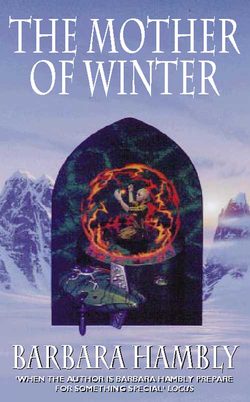Читать книгу Mother of Winter - Barbara Hambly - Страница 7
PROLOGUE
ОглавлениеIn the moonstone dawn, the lone rider dismounted at the top of the steps, passed through the black square open eye where the doors would one day be, and halted on the edge of shadowed abyss. The woman who lay on the obsidian plinth in the chasm’s midst knew by the shape of his shoulders and back, by the way he carried his head, who he was; there was in any case only one person he could be. The wind that brought the smell of the glaciers down to her funneled past him through the passageway and carried on it the stench of blood.
When he stepped clear of the gate’s collected gloom, she saw he was covered with it, as if he had lain down in a butcher’s shambles. Some of it she knew was his, all mixed with the nitrous grease of torch smoke; there was also mud on his bare left forearm where he had fallen or been thrown from his horse, and on his bare knees above his boot tops, as if he had knelt in gore-soaked earth—to raise someone in his arms, perhaps.
The great clean-hewed pit of the foundation lay between them, deep as the cliffs that surrounded the Vale, and filled with the night’s last shade. The plinth that rose through it, nearly to the level of the ground, was circled by half-made levels and support pillars like the greatest trees in some primordial iron forest, dwarfed to fragility by the chasm’s sheer size. The machines that fused the black stone walls, insectile monsters of crystal and meteor iron, stood quiescent on platforms in the scaffolding; smaller slave-crystals and drones floated in the air between like exhausted stars, and here and there great sheets of wyr-web flashed softly in the nacreous light. Where the stairways and catwalks joined and crossed between the greater platforms, sleeping figures could be seen, lying where they had collapsed within the rings and spheres of silver dust, dried blood, smoke and light that trailed off the fragile plank flooring to float like sea-wrack on the air.
He looked down to meet the woman’s eyes.
Depleted by last night’s Great Spell, she propped herself up with her hands and coughed, feeling twice her sixty years. As the man picked his way across the spiderweb lines of bamboo and planking, descended ladders and stepped over gaps that fell away into a thousand feet of gloom, she saw that he, too, moved carefully, holding to the ropes and stopping now and then to stand half bowed over, gathering strength.
“It’s all right,” she said, when he looked down from a ladder at the intricate patterns woven on the plinth’s circular top. “The spells are accomplished, such as they are. Stay between those two lines and all will be well.”
He was a respecter of such things. Not everyone was these days. He looked around him again, and she wondered if, from the plinth, he could see what she saw: the whole of the future edifice called forth in those ghostly traceries, as if the fortress already existed, wrought of starlight and future time.
Every Rune, every circle, every sigil and smoke-trace had been placed individually, by her hand or the hands of those who slept all around her huddled in the lee of the Foci, broken by what they had done.
And to no avail, she thought. To no avail.
She asked him, “Are they dead?”
He nodded.
“All of them?”
“All.”
It was not the worst thing she had ever borne, but in some ways more painful than the knowledge that the world’s end was coming sooner than anyone had reckoned. She had loved many of those who died last night.
“You should have asked our help.”
He was unshaven under the filth; even the ends of his long hair, by which he was nicknamed at Court, were tipped with grue. “It was the only chance you had, of raising the power to do this.” He had a voice like gravel and clinkers in an iron pan. “The locking point of sun, moon, and stars, you said The time of greatest power.” He swallowed, fighting pain. “It was worth what it cost.”
She folded her arms across her breasts, bare beneath the midnight wool of her cloak. The morning was very cold. Below her the murmur of water was loud where springs had been broached in the rock. The smell of wet earth breathed up around them. Far down the Vale where the trees grew thick at the head of the pass, birds were waking.
“No,” she said. “For we failed. We put forth all our strength, and all our strength was not enough. And all this—” The movement of her hand took in the half-raised walls, the silent machines, the chasm of foundation, the whisper of water and of that half-seen skeleton of light. “—all this will pass away, and leave us with nothing.”
Her head bowed. She hadn’t wept for years, not since one night when she’d seen a truth too appalling to be contemplated in the color of the stars. But her grief was a leaden darkness, seeming to pull them both down into the beginning of an endless fall. “I’m sorry.”
